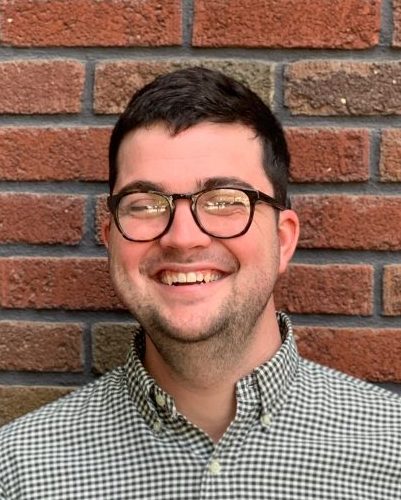By Ryan Hartman, Class of 2019
The stark fact is that genetic counseling is 95% female and 5% male. I understand this and I understood this coming into interviewing for programs in this field. It is valuable to have that in mind if you are a male because it will hit you in the face when you see all females at your interviews (to be fair I did meet one male at mine who is now a classmate). I was fully prepared to be the only male in my cohort, and that was something I was accepting as fact. I was told when I accepted a spot in the program that I was not the only male however. It turns out there are two other males in my cohort, and we are shattering percentage records of male to female ratios in genetic counseling programs.
More than once when we meet with other genetic counselors or those who know the field are there remarks about the amount of men we have (3/8; 5/16). I’m certainly proud of it, and I am more than happy to talk and interact so frequently with other males who are interested in what I am. I have a lot of hopes for the future of genetic counseling and one of them certainly is to be a mentor and recruiter of more men to this profession. I and other males who explore genetic counseling as a career could easily turn away from it because they aren’t able to find a mentor. I am not saying that a female cannot mentor a male, but personally when I was first looking into the field I wanted to talk to a man because I felt most comfortable doing that. I hope to be that person for many other young people in my days to come. I also think the field could be diversified with more males. There are certain appointments where a man might simply be more comfortable seeing another male. We are discussing deep aspects of life in a lot of counseling sessions, and men can certainly struggle with that in a variety of different ways. I think we could reach more people if we would expand this 5%.
There are many pros and cons to being a male in genetic counseling. I will start with the potential downsides. Stereotypes are the biggest hurdles I think I will face in my career. The field is 95% women for a reason. Women are generally considered to be more in touch with empathy and the helping professions. I don’t dispute this, but more exceptions exist than people realize I believe. When a person comes into a session and sees a male as their counselor, they may make immediate judgement about their character or personality. In order to accomplish what I want with my patients and dig to the root of their feelings, I need to be able to build rapport and establish trust in a matter of minutes. That is something that I struggle with on adapting a good strategy. I know I will continue to refine those skills as I go through and will become effective in those situations if they do arise. There also could be issues of being the vast minority in any field or area and struggling to have your voice heard. Males make up such a small percentage of the field that I can imagine difficulties in being represented accurately and fully.
I believe there are much more positives than negatives, however. First of all, as males we immediately stand out. I remember being asked about it in interviews, and it has continued into the program. It’s a little unfair because yes, I am a male but I am also more than that and my interest in this field goes deeper than my gender. It certainly is a plus though when you are a daisy in a field of poppies especially in interviews. I also think it immediately forces you to adapt to new norms. Suddenly you are a male interacting with almost all females. You are forced to understand group dynamics and know you are an outsider here in an obvious way. I like working with all types of people, and I find females are more fun to work with and provide a new perspective on many issues that I hadn’t thought about before. It has broadened my perspectives in so many positive ways.
My advice to any male interested in the field is to embrace who you are, show your interest in the field and don’t be shooed away by the large underrepresentation. If you like what you find about this field and want to pursue it then do it. There are so many types of people, both male and female, who this career fits. On the other hand, I know both males and females who I would not want as my genetic counselor. That should not be exclusive to your gender though. I would love to see more males explore genetic counseling and go into it. I think it can have massive positive impacts. I love this field as it is at 95%/5%, and if that is where it stays for my time in the profession I will have no qualms; however, I don’t want to see males shy away from it because of stereotypes or numbers.
